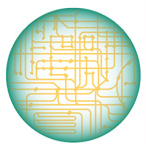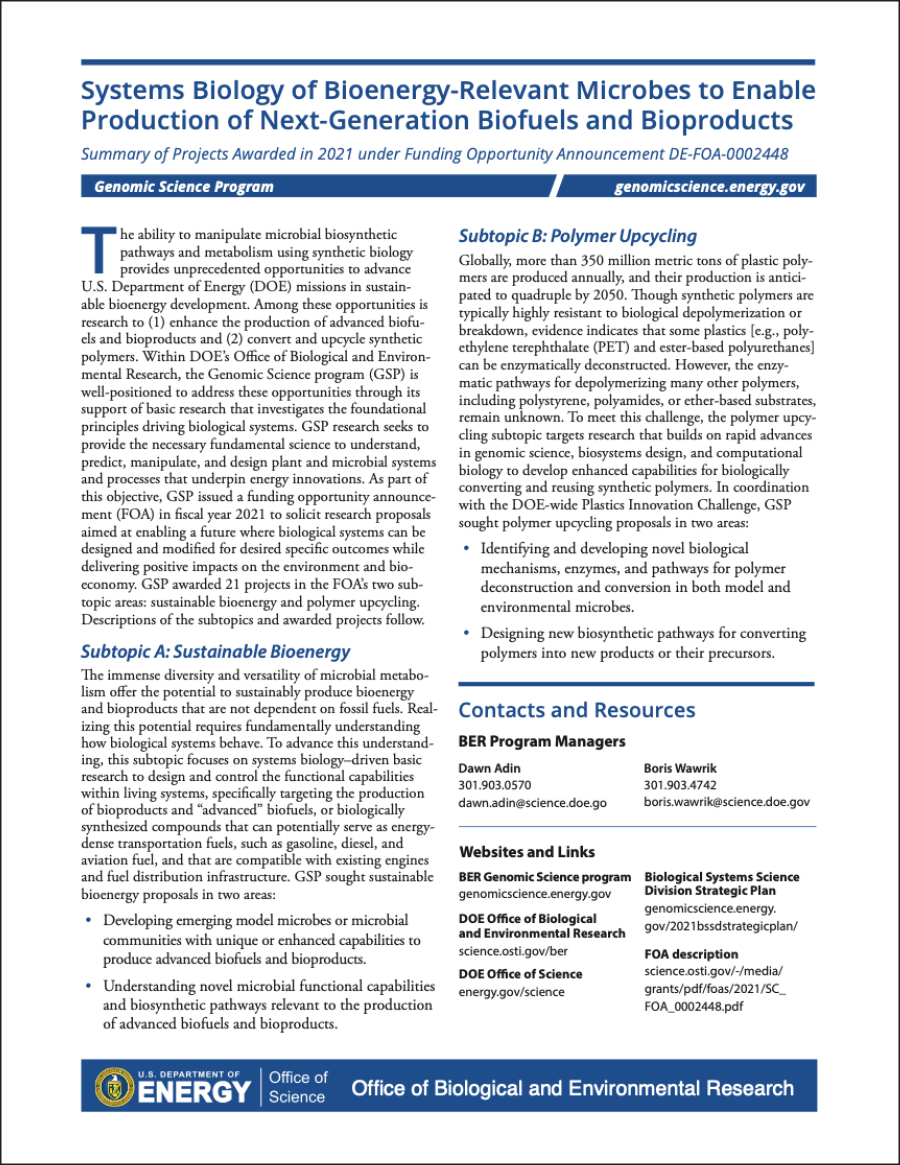Systems Biology of Bioenergy-Relevant Microbes to Enable Production of Next-Generation Biofuels and Bioproducts
- Print Publication: September 2021
- Download: PDF
- Funding Announcement: DE-FOA-0002448
Summary
The ability to manipulate microbial biosynthetic pathways and metabolism using synthetic biology provides unprecedented opportunities to advance U.S. Department of Energy (DOE) missions in sustain- able bioenergy development. Among these opportunities is research to (1) enhance the production of advanced biofuels and bioproducts and (2) convert and upcycle synthetic polymers. Within DOE’s Office of Biological and Environmental Research, the Genomic Science program (GSP) is well-positioned to address these opportunities through its support of basic research that investigates the foundational principles driving biological systems. GSP research seeks to provide the necessary fundamental science to understand, predict, manipulate, and design plant and microbial systems and processes that underpin energy innovations. As part of this objective, GSP issued a funding opportunity announcement (FOA) in fiscal year 2021 to solicit research proposals aimed at enabling a future where biological systems can be designed and modified for desired specific outcomes while delivering positive impacts on the environment and bioeconomy. GSP awarded 21 projects in the FOA’s two subtopic areas: sustainable bioenergy and polymer upcycling. Descriptions of the subtopics and awarded projects follow.
Subtopic A: Sustainable Bioenergy
The immense diversity and versatility of microbial metabolism offer the potential to sustainably produce bioenergy and bioproducts that are not dependent on fossil fuels. Realizing this potential requires fundamentally understanding how biological systems behave. To advance this understanding, this subtopic focuses on systems biology–driven basic research to design and control the functional capabilities within living systems, specifically targeting the production of bioproducts and “advanced” biofuels, or biologically synthesized compounds that can potentially serve as energy-dense transportation fuels, such as gasoline, diesel, and aviation fuel, and that are compatible with existing engines and fuel distribution infrastructure. GSP sought sustainable bioenergy proposals in two areas:
- Developing emerging model microbes or microbial communities with unique or enhanced capabilities to produce advanced biofuels and bioproducts.
- Understanding novel microbial functional capabilities and biosynthetic pathways relevant to the production of advanced biofuels and bioproducts.
Subtopic B: Polymer Upcycling
Globally, more than 350 million metric tons of plastic polymers are produced annually, and their production is anticipated to quadruple by 2050. Though synthetic polymers are typically highly resistant to biological depolymerization or breakdown, evidence indicates that some plastics [e.g., polyethylene terephthalate (PET) and ester-based polyurethanes] can be enzymatically deconstructed. However, the enzymatic pathways for depolymerizing many other polymers, including polystyrene, polyamides, or ether-based substrates, remain unknown. To meet this challenge, the polymer upcycling subtopic targets research that builds on rapid advances in genomic science, biosystems design, and computational biology to develop enhanced capabilities for biologically converting and reusing synthetic polymers. In coordination with the DOE-wide Plastics Innovation Challenge, GSP sought polymer upcycling proposals in two areas:
- Identifying and developing novel biological mechanisms, enzymes, and pathways for polymer deconstruction and conversion in both model and environmental microbes.
- Designing new biosynthetic pathways for converting polymers into new products or their precursors.

